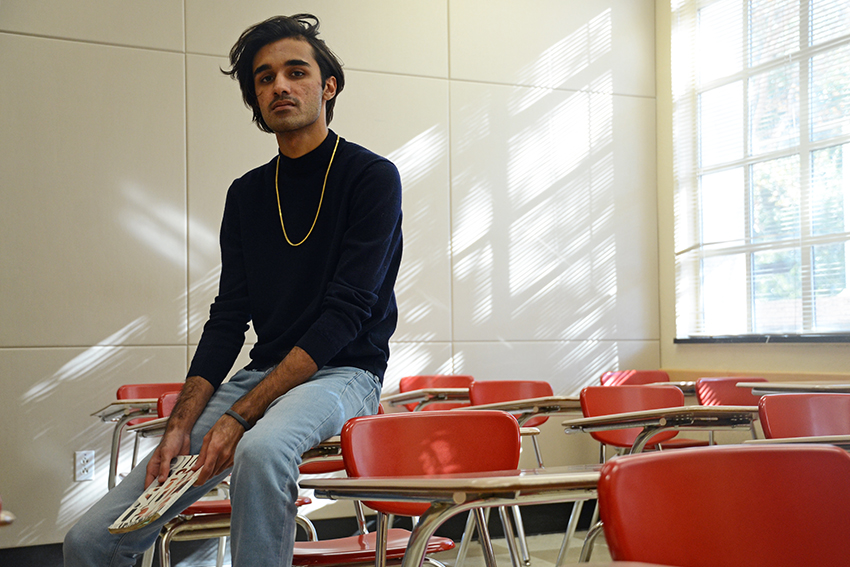For Alamgir Lalani, feeling out of place is a common sensation.
While at UT, the government senior’s status as a first-generation student makes him feels different than most of his peers. But when he goes back home, his college experiences also make it hard for him to relate to his parents.
“Leaving my home and discovering new things and people, I started to discover this new me,” Lalani said. “And some weekends having to go home to your parents as this new person creates a difference between who you are at school versus who you are at home.”
Kevin Cokley, a counseling psychologist and African diaspora and educational psychology professor, described experiences like Lalani’s as an “imposter phenomenon,” which is also known as imposter syndrome by some. First-generation college students commonly face the phenomenon in academic settings, Cokley said.
“I prefer the term impostor phenomenon rather than the impostor syndrome because the latter term suggests that it is a clinical disorder, which it is not,” Cokley said. “The impostor phenomenon is the experience among academically or professionally successful individuals of feeling like phonies or intellectual frauds.”
Lalani said he feels more pressure to do well in school because his parents don’t always understand college obstacles.
“I feel like I have more to prove to my parents,” Lalani said. “People that are already in that (college) system … I feel like the drive to succeed is different.”
But he also feels out of place when he visits his parents, who are Pakistani immigrants, because he realizes he is more privileged than they were.
“I lived a relatively privileged lifestyle … but I am seeing it through the lens of parents who didn’t,” Lalani said. “I hear stories of a time that weren’t like this … my mom telling me about bombs going off streets down from her — a childhood I’ve never lived. The idea of life is very different.”
Like Lalani, Adam Materne, a government senior and first-generation student, said he also had to adjust to UT because of his upbringing in Fort Hood, Texas, and experience in the military. Materne said his family and environment were more confrontational, so he had to learn to filter his language while at UT.
“When I interact with other students, I have to remind myself that they do not come from the same environment as I do,” Materne said.
Because of this Materne finds himself having to suppress his mannerisms and opinions. This brings him the most stress in college.
“I’ve always heard that college is very stressful, I don’t find it so myself,” Materne said. “But those are the times (when hiding my culture) that I feel the most stress.”
Ingrid Garcia, a journalism junior who will be the first in her Mexican family to graduate from college, knows what it’s like to be an outlier.
“My parents are immigrants, they have not been in the United States that long,” Garcia said. “Their generations before them have not been at this sole university or at a sorority or frat house where they could have made connections of (Greek) brother and sisters.”
Her experience as a Latina from a lower-income household sometimes makes her avoid conversations with more privileged students.
“I try to stay away from conversations where I can’t relate,” Garcia said. “For example, if someone’s tone is privileged … I try to separate myself from those situations.”
Imposter phenomenon affects roughly 70 percent of the population and can affect anybody, but Cokley said it especially affects minorities — like Garcia — on campus.
“There hasn’t necessarily been a group of people that has been found to be most likely to encounter the impostor phenomenon,” Cokley said. “But in my research I have focused on ethnic minority students because being minority students on predominantly white campuses, ethnic minority students especially (are) vulnerable to feeling like impostors.”
Anyone who is suffering from it should seek professional guidance, or talk with other students who are likely to be experiencing it, Cokley said.
But Cokley said for students like Lalani, Materne and Garcia, feeling like an imposter does not necessarily hinder their motivations to succeed.
“It can (affect their academics), but ironically it is not typically in a negative way,” Cokley said. “It makes (them) work even harder because they feel like they have something to prove, but it comes at a cost to their mental health.”
Despite having to adjust as first-generation student, Materne said it also motivates him and helps him not take obstacles too personally.
“I think I am a little more resilient because of my life experience,” Materne said. “I like the idea of being the first person to do something. It feels impressive.”
Working to accomplish his parents’ dream helps Lalani cope with occasionally feeling different than both his peers and his parents.
“Being a first generation, along with my siblings, feels really good because this was a dream my parents had for us,” Lalani said.
Garcia said she feels she had to work harder to earn her admissions into a four-year university, but she doesn’t let the imposter phenomenon mild her spirits.
“I’ve worked too hard to be here. Everything I have lived up until this point has lead me to where I am now,” Garcia said. “There’s no reason for me to doubt myself because I am confident in everything that I have accomplished …. I am not going to act like something I am not because I think it’s a waste of time.”





















